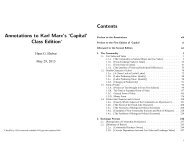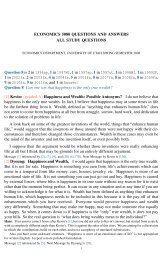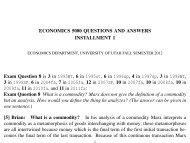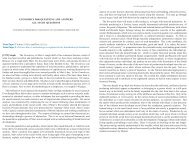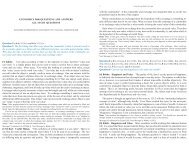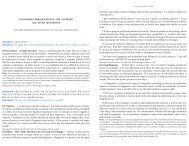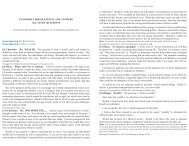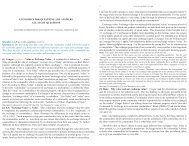Question 1 What did Marx mean with his formu - University of Utah
Question 1 What did Marx mean with his formu - University of Utah
Question 1 What did Marx mean with his formu - University of Utah
You also want an ePaper? Increase the reach of your titles
YUMPU automatically turns print PDFs into web optimized ePapers that Google loves.
U <strong>of</strong> <strong>Utah</strong> Econ 5080 2005fa 59<br />
should be grateful for any input. Class participants may be hesitant to give such input because<br />
they do not want to depress the grades <strong>of</strong> their peers. Therefore I am always waiting a<br />
little before I give you your grades. If someone corrects you, and then you respond by either<br />
acknowledging your error or explaining yourself better, then I will take your response into<br />
consideration when giving you your grade.<br />
Next Message by Hans is [582].<br />
[569] Iblindone: Re: Socially necessary labor-time. Now that I read my response I<br />
should have worded it a little different. In my attempt to make it simple and short I made<br />
an error. <strong>What</strong> I was trying to say was that the production method <strong>of</strong> hand woven linen<br />
wouldn’t be as productive as machine woven linen and would hence forth trade at a lesser<br />
value (not lesser than machine but as a homogenous commodity) because the average labor<br />
time to produce linen would decrease as a result <strong>of</strong> the new technology. When I was saying<br />
lesser value I wasn’t referring to hand vs. machine linen. I was referring it to the commodity<br />
as a whole in reference to the market. Obviously linen is linen and would be traded at the<br />
same exchange value whether it is machine or hand woven. I believe t<strong>his</strong> is what <strong>Marx</strong> was<br />
saying in Capital. If not please correct me.<br />
Next Message by Iblindone is [762].<br />
<strong>Question</strong> 86 is 52 in 1997ut, 68 in 1999SP, and 99 in 2008fa:<br />
<strong>Question</strong> 86 Did <strong>Marx</strong> introduce additional assumptions in order to resolve the paradox<br />
<strong>of</strong> the lazy worker, or does <strong>his</strong> solution follow from assumptions made or results derived in<br />
section 1.1.d?<br />
[115] Gza: graded A <strong>Marx</strong> <strong>did</strong> not make “additional assumptions” to resolve the problem<br />
<strong>of</strong> the “lazy worker”. In section “1.1 d”, <strong>Marx</strong> provides two alternatives for analyzing the<br />
value <strong>of</strong> labor in which he addresses the problem <strong>of</strong> the “lazy worker.” The first analysis<br />
does not solve the problem <strong>of</strong> the “lazy worker” while <strong>his</strong> second analysis does.<br />
<strong>Marx</strong> first says in 129:1 “a useful article has commodity value only because human labor<br />
in the abstract is objectified or materialized in it.” T<strong>his</strong> <strong>mean</strong>s that labor is treated just like<br />
articles in the market place in that articles can be exchanged for other goods because articles<br />
have value in the sense that they use up resources from society. Labor, like articles also<br />
uses up society’s supply <strong>of</strong> abstract labor. <strong>Marx</strong> suggests that the amount <strong>of</strong> goods that one<br />
can get in exchange for an article is dependent upon the amount <strong>of</strong> labor that went into the<br />
production <strong>of</strong> the article, or “how much labor was congealed in it” (Hans). The value <strong>of</strong> the<br />
article is in the “total” labor that went into its production.<br />
<strong>Marx</strong> directly poses the problem <strong>of</strong> the “lazy worker” from the above analysis by stating<br />
that “it might seem that the value <strong>of</strong> a commodity is determined by the amount <strong>of</strong> labor spent<br />
in its production, the more lazy and inept the laborer, the more valuable <strong>his</strong> commodity”<br />
(<strong>Marx</strong> 129).<br />
From t<strong>his</strong> abstract analysis, <strong>Marx</strong> shifts into the concept <strong>of</strong> “average labor” as a way to<br />
get out <strong>of</strong> the “lazy worker” dilemma. He suggests that “the individual commodity counts<br />
here generally as an average <strong>of</strong> its kind” <strong>mean</strong>ing that labor time and the commodity’s usevalue<br />
are to be looked at on the average. The majority <strong>of</strong> articles will contain the socially<br />
necessary labor time and as long as use-values are equal, the market will treat various articles<br />
60 2005fa Econ 5080 U <strong>of</strong> <strong>Utah</strong><br />
the same. The solution to the “lazy worker” is that he will have to “compete” <strong>with</strong> “average”<br />
workers producing identical articles, so he therefore cannot demand more for <strong>his</strong> output<br />
simply because it took him longer.<br />
The only “assumption” that <strong>Marx</strong> seems to make is that the “average” is actual and majorital.<br />
<strong>Marx</strong> is correct in assuming that regardless <strong>of</strong> the timeliness <strong>of</strong> the “work force”,<br />
there is always going to be an average time in which products are made, even if it is a slow<br />
(on average). It does not really matter at t<strong>his</strong> point if the whole work force is lazy because<br />
the value <strong>of</strong> an article is always going to be sold at the same price and workers will have to<br />
use the average as the standard, no matter how slow it is. The average is a reflection <strong>of</strong> the<br />
laborers as a whole.<br />
Where there can be a problem in <strong>Marx</strong>’s analysis is if he assumes that the majority <strong>of</strong> laborers<br />
are average. If the majority are not average and most could objectively be considered<br />
“slow” and it is an elite few that make the “average” high, then there is going to be a problem<br />
<strong>with</strong> exchanges. However, I do not think that <strong>Marx</strong> is using the term “average” literally.<br />
Instead I think he is using it to describe what “most” laborers are like and how fast they work<br />
and not the mathematical operation. I think I am justified in interpreting <strong>Marx</strong>’s use <strong>of</strong> the<br />
term “average” to refer to the majority because he is drawing <strong>his</strong> conclusions based on <strong>his</strong><br />
analysis <strong>of</strong> total labor-power being “represented in the values <strong>of</strong> the commodities produced<br />
by society,” where society is mediated through the concept <strong>of</strong> what is “socially necessary.”<br />
T<strong>his</strong> eludes to <strong>Marx</strong> to take into consideration the context <strong>of</strong> the dilemma and not reduce the<br />
standard in mathematical terms. If <strong>Marx</strong> is using the average to describe the majority and<br />
“social necessity” then he makes no unnecessary assumptions regarding the “lazy worker”<br />
dilemma.<br />
The only question at t<strong>his</strong> point in <strong>Marx</strong>’s argument would be what happens to the “lazy<br />
worker”? Within section “1.1 d” there is no explicit consequence. It can be assumed that<br />
the lazy worker stops being lazy because he is held to the average standard. However, if he<br />
continues to be lazy, I would assume he/she starves. If the whole labor market becomes lazy<br />
then everyone hurts, even if they meet their average standard. T<strong>his</strong> is still not a desirable<br />
outcome. These problems are not addressed, but logically, I do not think <strong>Marx</strong> needs to<br />
address them <strong>with</strong>in t<strong>his</strong> section.<br />
Hans: About your second paragraph: <strong>Marx</strong> has not yet made the assumption that labor is a commodity. He will<br />
introduce t<strong>his</strong> in chapter Six. Even in society in which labor itself is not a commodity (i.e., one cannot hire wage<br />
workers or it is very unusual to do so), labor still determines the values <strong>of</strong> the goods traded.<br />
You are right, in a wage-labor situation the slow worker will get fired. In a situation where the slow worker sells<br />
<strong>his</strong> or her own product, he or she will have to work longer than others to produce an equivalent for the things he or<br />
she needs.<br />
I don’t think “eludes” is the word you <strong>mean</strong>t.<br />
Next Message by Gza is [267].<br />
[117] Thugtorious: (graded A) Can every laborer be lazy . . . ? At the bottom <strong>of</strong> Gza’s<br />
response and at some point in the middle, he/she says that if the labor market as a whole<br />
becomes lazy an undesirable outcome would occur. However, my question is can the whole<br />
labor market be “lazy”? Not in the sense <strong>of</strong> the word “lazy” as in “is it physically, mentally,<br />
emotionally, etc. possible?” But, more in the sense <strong>of</strong> logically plausible <strong>mean</strong>ing: if more<br />
people work at a slower pace in production than do not, should not the slower pace become



